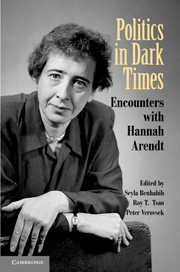Book contents
- Frontmatter
- Contents
- Notes on Contributors
- Introduction
- Part I Freedom, Equality, and Responsibility
- Part II Sovereignty, the Nation-State, and the Rule of Law
- Part III Politics in Dark Times
- 10 In Search of a Miracle: Hannah Arendt and the Atomic Bomb
- 11 Hannah Arendt between Europe and America: Optimism in Dark Times
- 12 Keeping the Republic: Reading Arendt's On Revolution after the Fall of the Berlin Wall
- Part IV Judging Evil
- Index
12 - Keeping the Republic: Reading Arendt's On Revolution after the Fall of the Berlin Wall
Published online by Cambridge University Press: 05 June 2012
- Frontmatter
- Contents
- Notes on Contributors
- Introduction
- Part I Freedom, Equality, and Responsibility
- Part II Sovereignty, the Nation-State, and the Rule of Law
- Part III Politics in Dark Times
- 10 In Search of a Miracle: Hannah Arendt and the Atomic Bomb
- 11 Hannah Arendt between Europe and America: Optimism in Dark Times
- 12 Keeping the Republic: Reading Arendt's On Revolution after the Fall of the Berlin Wall
- Part IV Judging Evil
- Index
Summary
Democracy won the Cold War by default. The Berlin Wall seemed simply to collapse, its authority broken, its power shriveled. There was no revolutionary act; the conflicts of the past just faded away, almost before anyone was aware that they had gone. The once-dominant ruling communist parties and their ideologies shriveled overnight. But a revolution without revolutionaries left a political space without participants. As a result, triumphant democracy has become a threat to itself. It acts before it thinks. Alone on the political stage, it runs the classical risk of pleonaxia, overreaching. The Bush administration's attempt to impose democracy worldwide threatened to destroy its foundations at home; but many of the liberal critics of what they saw as “imperialist” adventurism fail to take seriously the very real evils that the American crusade seeks to eradicate. The democratic warriors have a valid point when they oppose tyrants like Saddam Hussein, but they cannot claim that their liberal critics are therefore antidemocratic. If democracy “won” the Cold War, what does its victory mean? This question provides the background for a rereading of Hannah Arendt's On Revolution, a book that tried to understand the uniqueness of the American form of democracy, the revolution that was at its origin, and the spirit that it bequeathed to contemporary Americans.
The 1962 introduction to On Revolution calls attention to the unique relation of war and revolution in the years after World War II. Because war has become impossible in the nuclear age, “those who still put their faith in power politics in the traditional sense…and, therefore, in war,” will have mastered what is now an “obsolete trade.” The only remaining justification for war, she adds knowingly, is a revolution that claims to defend “the cause of freedom.” But like war, such a revolution would make use of violence, which is the “anti-political” province of technicians, whose use threatens the freedom that it professes. This dilemma had been seen already in the seventeenth century – which, as Arendt notes, had seen its share of violence. Philosophers invented the fiction of a prepolitical state of nature in order to show that the political realm – which is the locus of freedom – does not emerge simply from the fact of people living together. The political is created; it has a beginning that separates it from prepolitical life just as the modern notion of revolution claims to inaugurate a rupture with what preceded it. But this act involves a paradox. The need to break with the past in order to found the new means that the new order has itself no proper legitimacy; its only foundation is the violent revolutionary “crime” that destroyed the old order. This was the rock against which the French revolutionary hopes crashed again and again.
- Type
- Chapter
- Information
- Politics in Dark TimesEncounters with Hannah Arendt, pp. 277 - 290Publisher: Cambridge University PressPrint publication year: 2010
- 2
- Cited by



